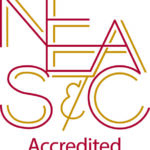We bet you’re wondering what your trip to Chewonki is going to be like. You will be participating in Chewonki Outdoor Classroom, which works with over 1,600 students from schools all over New England every spring and fall. As your Outdoor Classroom Educators, we can tell you that you will be busy, you will be challenged, and you will have tons of fun! It may be hard at times, but you will make new discoveries and even some new friends.
Our advice to you is this – be sure to follow your packing list carefully, and remember: the most important equipment in any adventurer’s backpack is an open mind, a positive attitude, and a willingness to try new things! If you bring these, then your Chewonki trip is going to be a blast!
See You Soon!
The Base Camp Experience
Students in Chewonki Outdoor Classroom overnight programs live in small camping groups at one of our shoreside campsites. Each group consists of 10-12 students with an instructor and one teacher/chaperone from the school.
Each student takes responsibility for the work that needs to be done around the campsite, such as wood gathering and splitting, carrying equipment and fresh water to the site, cooking and clean-up, pitching tents, and much more. You will sleep in tents at the campsites.
Our campsites are beautiful and rustic – each one includes a fire pit, log benches, tent platforms, picnic table, and privy.
Each day you will participate in two dynamic activities, focused on group challenges, outdoor living skills, or ecology. Your teachers will decide the details of your program before you arrive at Chewonki. Time is available for exploration, music, stories, songs, journal writing and discussions about each day’s activities.
Our Goals
We have 3 goals for all Outdoor Classroom students: First, that each student makes a new connection, whether that is with a peer, a teacher, their instructor, or the natural world; next, that they going home having had a positive outdoor experience; and finally, that they make a memory that will last a really long time, if not forever.
Your Goals
Our instructors and your teachers have many goals for your time at Chewonki. Most important though, is for you to think hard about your goals for the week.
- What do you want to get out of the program?
- Do you want to learn some skills like using an ax or cooking over a fire?
- Would you like to develop your self confidence or make new friends?
- Maybe you would like to become comfortable in the woods at night or learn to identify ten kinds of trees?
Take the time to do some serious thinking before you arrive. We believe it will help to make the experience more rewarding.
Tips to Prepare you for Chewonki
- Read the equipment list, and follow it very closely. Possible cold, rainy weather means you really need to have the correct clothing and gear.
- Work together with your parents to pack for the Chewonki overnight. You will be responsible for packing your own bags for the return trip home, so you should be a full participant in packing and organizing your things before leaving home.
- Be sure that you feel comfortable spending the night away from home. If you have never spent a night away, arrange for a sleepover at a relative’s or friend’s house to get some practice.
- Take some time to set goals and talk about the Chewonki experience before it begins.
Use These Questions as a Guide
- What are you looking forward to about your time at Chewonki?
- What makes you nervous or concerned?
- What strategies can you use to successfully meet the challenges of a base camp?
- Why is an experience like this one valuable?
Contact Us
If you have any questions about your program or equipment, please ask the teachers at your school. They are wonderful resources and can answer most of your questions, or contact us at:
Email: outdoors@chewonki.org
Phone: (207) 882-7323 ext 151
Web: www.chewonki.org
Vocabulary
This is a list of some of the terms you will hear most frequently throughout your visit to Chewonki.
Chewonki: A transliteration of a Wabanaki word meaning “land extending into the water with a big ridge.” This describes what the topography of Chewonki Neck looks like from the vantage point of a canoe.
Billet: A piece of wood, about the length of a forearm, that is ideal for splitting into firewood.
C.E.E. : The Center for Environmental Education. It is the big red building you will see when you arrive.
Chewonki Neck: Our 400-acre campus is a peninsula that juts out into Montsweag Bay. It is lovingly referred to by staff and participants as “The Neck.” There are 11 shoreside campsites and miles of wooded trails.
Debrief: A discussion that helps participants focus on the goals and results of activities. OC educators frequently bring closure to challenges by talking briefly with the group about their achievements, the areas they struggled with and the lessons they learned.
Base Camp: Any Outdoor Classroom program that camps for at least one night on Chewonki Neck at one of our 10 campsites.
Night Walk: An evening activity where the participants and teachers take a walk in the dark without flashlights to lessen fears of the night, to help students value each of their senses, and to learn more about the lives of nocturnal animals.
Outdoor Living Skills: Lessons in low impact camping that includes camp set-up, firebuilding, outdoor cooking, and camping hygiene.
Traveling Natural History Program: Traveling programs for schools, libraries, camps and community groups. Some schools choose to have one of these programs as an evening activity. Many programs include live animals.
Packout: The food and equipment supply center for overnight and wilderness trip programs. It is usually the first place that each OC educator goes in the morning, and is often used as a meeting place.
Privy: An outhouse-style bathroom located near each campsite on Chewonki Neck. Stocked with toilet paper, hand sanitizer, and a place to dispose of hygiene products.
See-Far: Another option for participants when nature calls. The Outdoor Program Instructor will explain how far into the woods participants must go in order to go to the bathroom. Reference Privy for more bathroom options.
Town: A nickname for the main campus area where most of the buildings are.
Compost Toilet: A toilet that students use throughout their stay at Chewonki that turns human waste into fertilizer. It is not an outhouse.
Wanigan: A storage box. Each base camp group takes at least one of these boxes out to their campsite.
Duluth: A big backpack for carrying gear. Each base camp group will take a Duluth out to their campsite.



